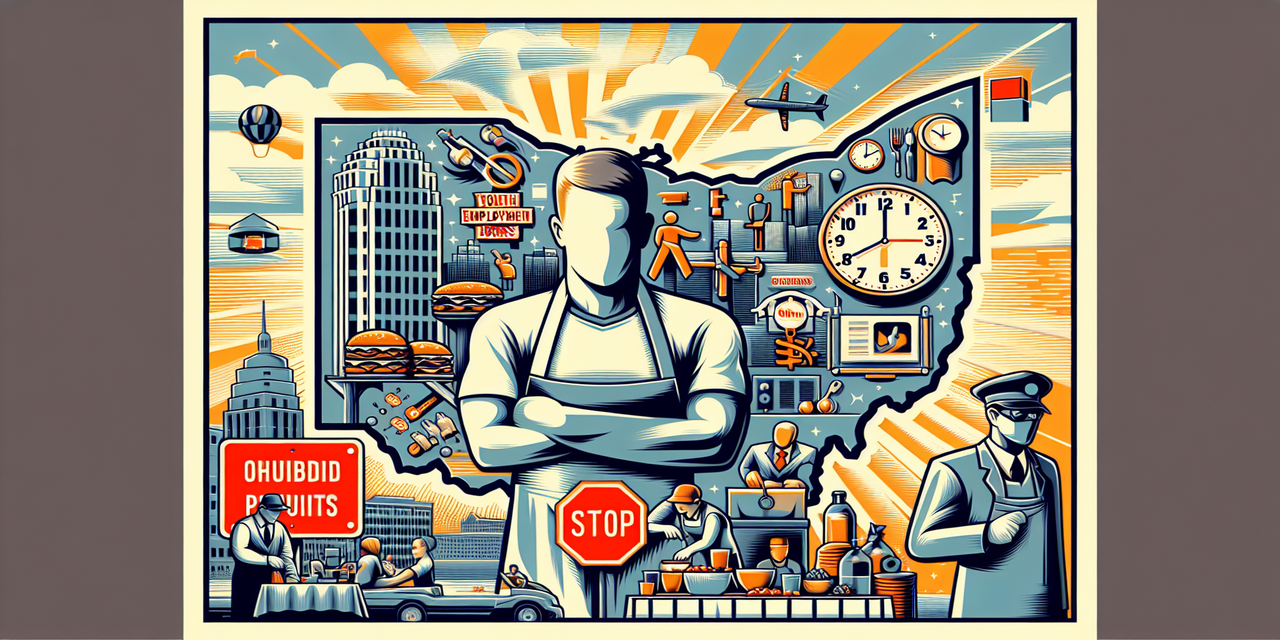Ohio Youth Employment Laws for Restaurants: Key Takeaways
- Minors aged 14-17 must obtain a work permit before starting employment in Ohio restaurants.
- Work hour restrictions vary by age and school attendance, with tighter limits for 14-15 year-olds during school weeks.
- Certain hazardous duties, including cooking, operating power-driven machines, and driving, are prohibited for minors based on age.
Ohio has clear regulations governing youth employment in restaurants, focusing on work permits, allowable hours, and prohibited duties.
These laws protect minors' safety and academic commitments while allowing safe work experiences.
For role-specific age guidance, see server age requirements.
1. Work Permits Required for Minor Restaurant Workers in Ohio
Before any minor aged 14 to 17 begins working in a restaurant, Ohio law mandates obtaining a work permit.
This process starts with a "Pre-Application for Minor Work Permit," which requires signatures from the minor's parent or guardian and the prospective employer.
The minor must also provide a physician's certificate verifying physical fitness for employment.
The completed application is submitted to the minor's school, which verifies attendance and academic standing before issuing the permit.
Employers should ensure these permits are valid and maintained in their records to comply with state requirements.
Before advertising roles for minors, review recruitment compliance.
2. Ohio Youth Employment Work Hour Restrictions for Restaurant Minors
Work Hours for Minors Aged 14 to 15
Ohio places strict limits on the work hours for the youngest restaurant employees.
During the school year, they may work no more than 3 hours on a school day and 18 hours in a school week.
On non-school days, they can work up to 8 hours and no more than 40 hours in a non-school week.
Permissible working hours are between 7 a.m. and 7 p.m.
During summer (June 1 to September 1) or school holidays longer than five days, these limits relax slightly to allow working between 7 a.m. and 9 p.m., up to 8 hours per day and 40 hours per week.
If hiring in QSRs, review fast-food age requirements.
Many 14- and 15-year-olds start as food runner duties.
Work Hours for Minors Aged 16 to 17
Older minors enjoy fewer restrictions but still face rules to protect their well-being.
When school is in session, they cannot work more than 30 hours per week without written parental and school permission.
The combined hours of school and work must not exceed 48 hours per week.
Additionally, they cannot start work before 7 a.m. on school days or work past 11 p.m. the night before a school day.
When school is not in session, there are no restrictions on their working hours.
If your team serves alcohol, confirm the alcohol serving age.
Older minors may work front-of-house; review server responsibilities.
3. Prohibited Duties for Minors Working in Ohio Restaurants
Restricted Tasks for Minors Aged 14 to 15
The law restricts younger minors from engaging in hazardous tasks in restaurant settings.
They cannot perform cooking, except limited exceptions such as at soda fountains, lunch counters, snack bars, or cafeteria serving counters.
Baking, operating or maintaining powerful food equipment like slicers, grinders, and mixers is prohibited.
Working in freezers, meat coolers, or areas where goods are manufactured or processed is also forbidden.
Suitable non-hazardous back-of-house work can include dishwasher duties.
Restricted Tasks for Minors Aged 16 to 17
While having more work options, older minors face limitations to prevent dangerous exposure.
They cannot operate power-driven meat or poultry processing machines, commercial mixers, or certain bakery machines.
Driving motor vehicles on public roads as part of their job and operating balers or compactors are also prohibited.
When allowed, older minors may assist with cold prep; see prep cook duties.
4. Employer Responsibilities Under Ohio Youth Employment Laws
Employers in Ohio restaurants must keep accurate records for each minor employee, including work permits, assigned duties, and hours worked.
They are responsible for providing a safe and healthy workplace, including proper training on workplace safety protocols related to minor workers.
Additionally, minors must receive a 30-minute rest break after five consecutive hours of work, a crucial well-being protection.
Failure to comply with these requirements can lead to penalties and jeopardize business operations.
5. Compliance Best Practices and Resources for Ohio Restaurants
To ensure compliance, Ohio restaurant employers should maintain a clear process for verifying work permits before hiring minors and document work hours diligently.
Designating supervisors to oversee youth workers and enforcing prohibited duty restrictions reduces safety risks.
Posting relevant youth employment rules and providing ongoing training helps both employees and managers stay informed.
For further information and official guidance, consider consulting the following resources:
- Ohio Revised Code - Chapter 4109: Employment of Minors
- U.S. Department of Labor - Child Labor Rules for Employing Youth in Restaurants
- Ohio Department of Commerce - Minor Labor Laws
Ohio Youth Employment Laws for Restaurants: Conclusion
Ohio's youth employment laws strike a balance between offering minors valuable work experience and safeguarding their health, education, and safety.
By understanding and following regulations around work permits, limited working hours, and prohibited duties, restaurant employers can create a compliant and supportive environment for young workers.


.png)

.png)
.jpg)